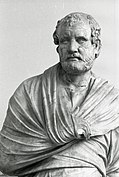Apostle
The Ancient Greek ἀπόστολος (apóstolos) can be translated to "ambassador" and "envoy" and was in some instances used this way in Ancient Greece.[1]
An apostle (/əˈpɒsəl/), in its literal sense, is an emissary. The word is derived from Ancient Greek ἀπόστολος (apóstolos), literally "one who is sent off", itself derived from the verb ἀποστέλλειν (apostéllein), "to send off". The purpose of such sending off is usually to convey a message, and thus "messenger" is a common alternative translation; other common translations include "ambassador" and "envoy". The term in Ancient Greek also has other related meanings.[1]
The term derives from the Ancient Greek.
Terminology
The term apostle is derived from
The word apostle has two meanings: the broader meaning of a messenger and the narrower meaning of an early Christian apostle directly linked to Jesus. The more general meaning of the word is translated into Latin as missiō, and from this word we get missionary.[7]
The term only occurs once in the
The adjective apostolic (
Judaism
"Apostoloi" was the official name given to the men sent by the rulers of Jerusalem to collect the half-shekel tax for the Temple, the tax itself being called "apostolé.[9]
Christianity
New Testament
Before their sending away, the Twelve had been called disciples, or "students" (Latin discipulus; Greek μαθητής mathētḗs; Hebrew לִמּוּד limmûdh; all meaning "one who learns").[10] Jesus is stated in the Bible to have sent out the Twelve Apostles, "whom he also named apostles" (Luke 6:13), first before his death "to the lost sheep of Israel" (Matthew 10), and after his resurrection, to spread the message of the Gospel to all nations (Matthew 28:16–28:20). There is also a tradition in the Eastern Churches of "Seventy Apostles", derived from the seventy-two disciples mentioned in the Gospel of Luke.
The title apostle from the New Testament was also given to others in the reference to the
Modern-day apostle in the apostolic movement
A modern-day Apostle in the tradition of the Apostolic-Prophetic movement is one who is "called and sent by Christ to have the spiritual authority, character, gifts and abilities to successfully reach and establish people in Kingdom truth and order, especially through founding and overseeing local churches”, according to Dr. David Cannistraci.[12] An "apostle" is one who has a call to plant and oversee churches, has verifiable church plants and spiritual sons in the ministry, who is recognized by other apostles and meets the biblical qualifications of an elder.[13]
Pentecostal movements
In modern usage, missionaries under Pentecostal movements often refer to themselves as apostles, a practice which stems from the Latin equivalent of apostle, i.e. missio, the source of the English word missionary.[citation needed]
Latter Day Saint movement
The Church of Jesus Christ of Latter-Day Saints has always had, among its leadership, at least twelve individuals identified as apostles. Their primary role is to teach and testify of Jesus throughout the world.[14]
In the ChurchofJesusChristofLatter-daySaints
In the Latter Day Saint churches, apostles are members of the
Irvingism
The Catholic Apostolic Church was led by twelve "apostles" until the last one died in 1901.[18] Some of the denominations that descend from the Catholic Apostolic Church, such as the New Apostolic Church, are led by apostles. The Chief Apostle is the highest ranking minister in the New Apostolic Church.
Islam
In
and other prophets as being messengers as well.Baháʼí Faith
The
These individuals played a vital role in the development of Bahá'u'lláh's Faith, consolidating its adherents and bringing its teachings around the world. To Baháʼís, they filled a similar role as the
See also
- Apostol (disambiguation), first and family name
- Apostolic (disambiguation)
- Equal-to-apostles
- Bábíreligion.
- Seventy disciples, also known as the "Seventy Apostles" by the Orthodox Church
- Twelve Apostles (disambiguation)
Notes
- Qur'an
References
- ^ a b c d "ἀπόστολος". Liddell, Scott, Jones Ancient Greek Lexicon. Archived from the original on 2022-01-30. Retrieved 2022-01-31.
- ^ "G652 - apostolos - Strong's Greek Lexicon (kjv)". Blue Letter Bible. Retrieved 2022-01-31.
- ^ Bart Ehrman - The History of the Bible: The Making of the New Testament Canon The Teaching Company, Lesson no. 4.
- ISBN 9780060738174.
- ^ a b c "Definition of APOSTLE". www.merriam-webster.com. Retrieved 2022-01-31.
- ^ "apostle". Cambridge dictionary.
- ISBN 978-0-19-957112-3.
- ^ Wilhelm Schneemelcher, Robert McLachlan Wilson New Testament Apocrypha: Writings relating to the Apostles- 2003 - 0664227228 Page 7 "Unfortunately the adjectival noun Απόστολος occurs in LXX only in a single passage, and indeed as a translation of the Hebrew shaluach (passive participle of shalach - 1 Kings 14:6)."
- ^ "APOSTLE AND APOSTLESHIP - JewishEncyclopedia.com". jewishencyclopedia.com. Retrieved 2022-08-17.
- ^ Cassell's Latin Dictionary, Revised by Marchant & Charles
- ISBN 0-19-280290-9.
- OCLC 180766628.
- ISBN 978-0830718450.
- ^ "Quorum of the Twelve Apostles". 10 July 2021. Archived from the original on 2019-07-09. Retrieved 10 July 2021.
- ISBN 0-88494-062-4.
- ^ Ephesians 2:20
- ^ The Articles of Faith 1:6
- ^ Chisholm, Hugh, ed. (1911). . Encyclopædia Britannica. Vol. 5 (11th ed.). Cambridge University Press. p. 533.
- ^ Concise Encyclopedia of Islam, C. Glasse, Messenger
- ^ A-Z of Prophets in Islam and Judaism, B.M. Wheeler, Apostle
- ^ Quran 37:139
- ^ Quran 37:123
- ^ Quran 19:54
- ^ Quran 7:85
External links
 The dictionary definition of apostle at Wiktionary
The dictionary definition of apostle at Wiktionary

